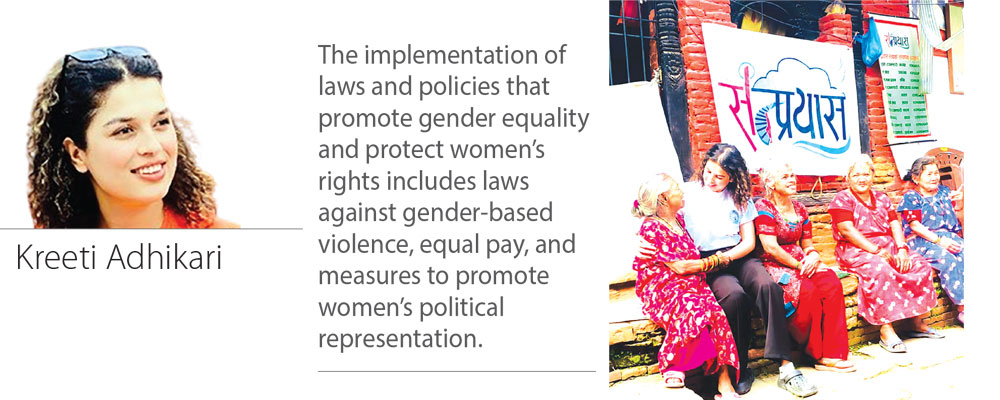- Friday, 20 February 2026
Feminism Is All About Equal Opportunities
People have misconceptions about feminism, thinking it only supports women, but that’s not true. Feminism is all about having equal rights and opportunities for all genders. The only thing is that feminism has profound impacts on women’s lives by changing traditional gender roles and advocating for equality. Feminism supports the idea that all genders have different strengths, perspectives, and social roles. Feminism originated in the 18th century in Europe. They started with women’s rights: the right to vote, equal pay, receive education, and have equal rights to make decisions about marriage and maternity leave. They are continuing their campaign worldwide. In the context of Nepal, feminism has made a positive impact on women's lives. The most important changes have brought equality and empowerment.
Women are now more aware of their rights and have been able to challenge traditional gender roles. They have gained access to education, healthcare, and job opportunities. Feminism has also helped address issues like child marriage and domestic violence. There have been several initiatives for women's empowerment that focus on providing education and skills training to women in rural areas. Another initiative is the Women's Leadership Development Programme, which helps to enhance the leadership skills of women and promote their participation in decision-making processes. Organisations like Women for Human Rights and the Women's Rehabilitation Centre have been working to support women's rights and provide resources for survivors of gender-based violence. These initiatives are making a real difference in empowering women across Nepal. The LGBTQ+ movement and feminism often intersect and support each other in the fight for equality. Feminism recognises that gender norms and expectations can apply to all individuals, including LGBTQ+.
Many feminists advocate for the rights of LGBTQ+ individuals, including the right to marry, adopt children, and live free from discrimination and violence. After a lot of challenges, Nepal became the first country in South Asia to register same-sex marriage. In the 19th century, women faced a lot of challenges and limitations in many parts of the world, including Nepal. Women were expected to fulfil traditional roles as wives, mothers, and homemakers, with limited opportunities for education and employment. Women had little to no say in matters such as property ownership, inheritance, and decision-making.
They were subjected to societal expectations and strict gender norms that restricted their freedom. Since the feminist movement, there have been significant changes in domestic life. Women have gained more independence and agency in making decisions about their lives, including their education, careers, and relationships. Traditional gender roles and expectations have been challenged, leading to a more equitable division of household responsibilities between partners. Women have also gained equal rights and opportunities, which has empowered them economically and socially.
These changes have helped to create more balanced and fulfilling domestic lives for both women and men. Various initiatives have been implemented to address gender disparities in the workforce, entrepreneurship, and access to economic opportunities. For example, organisations like Women for Human Rights (WHR) have been working to uplift marginalised women by providing them with vocational training, micro-credit programmes, and support for income-generating activities. Government policies and programmes have been developed to promote women's participation in sectors such as agriculture, tourism, and small-scale industries. These efforts have contributed to improving women's economic status and promoting gender equality in Nepal.
The feminist movement has brought significant changes to society. It has challenged traditional gender roles, fought for equal rights and opportunities, and raised awareness about issues affecting women. Feminism has sparked conversations, inspired policy changes, and empowered individuals to challenge inequality. It has paved the way for progress in areas such as reproductive rights, workplace equality, and gender-based violence.
Nepal is still facing challenges in rural areas to make changes in reproductive health rights. Some of the traditional societal, political, and religious ideologies are hard to change. We need better policies to make people aware of sexual education, contraception, safe and legal abortion, and quality healthcare during pregnancy and childbirth. Feminism has been advocating for these rights. It is important to ensure that everyone has the autonomy and support they need to make decisions about their reproductive health and well-being. Both movements aim to challenge and dismantle societal norms.
There are some examples of women’s leaders in Nepal. One of the figures is Bidhya Devi Bhandari, who became the first female president of Nepal in 2015. Another remarkable female leader is Sushila Karki, who became the first female chief justice of Nepal’s Supreme Court in 2016. She has been a champion for justice and women’s rights. Another inspiring figure is Shrinkhala Khatiwada, who was crowned Miss Nepal World in 2018 and has used her platform to advocate for various social causes, including women’s empowerment and education.
One of the most popular women activists is Sabitri Subedi, also known as Jaya Nari. She has been advocating for women’s rights; her main aim is to give justice to the victims, provide sexual education, empower women, and be actively involved in other social causes. Feminism has made several changes that have positively impacted women’s lives.
The implementation of laws and policies that promote gender equality and protect women’s rights includes laws against gender-based violence, equal pay, and measures to promote women’s political representation. When women have equal opportunities in education, employment, and decision-making, it benefits everyone in society. It helps women fulfil their potential contributions to the economy of a country. Gender equality leads to better health outcomes, reduced poverty, and strong communities. By recognising the challenges that women have been facing, we can create a better world where everyone has equal rights and opportunities. However, feminism has made a lot of changes in women’s lives.
(The author is a president of Smile Trust Nepal.)















